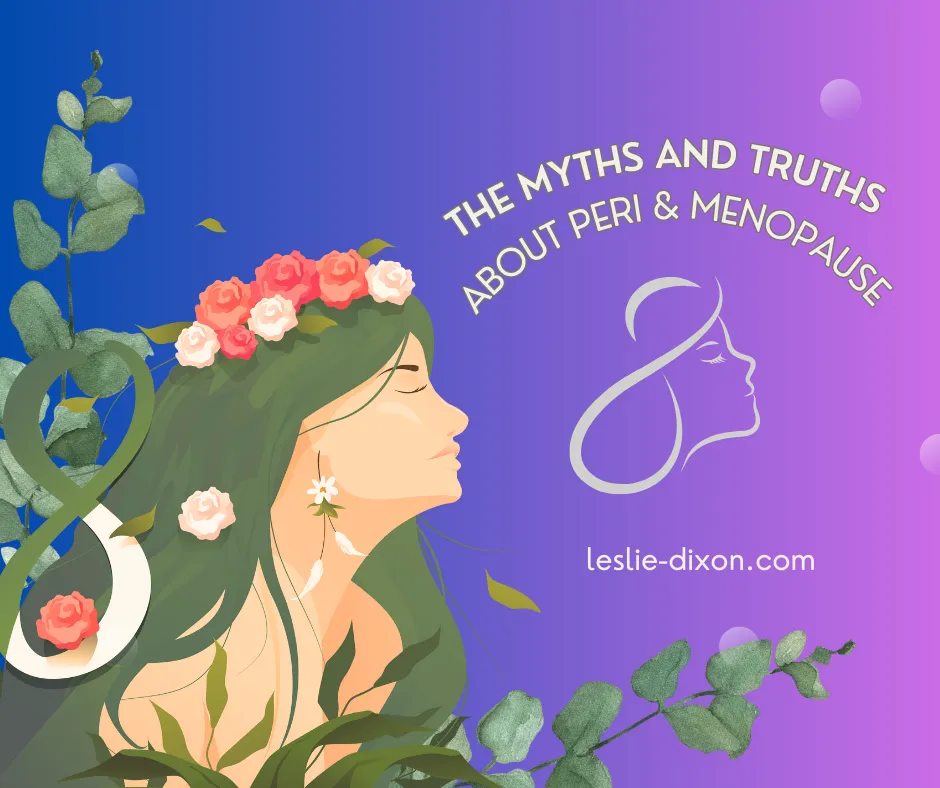
The Mystery of Perimenopause
The Myths and Truths About Peri & Menopause – Oh MY!!
There is something mysterious about both Perimenopause and Menopause. This blog will demystify both and give you information and valuable tools. It will also include an extensive roadmap to help you navigate as stress-free as possible.
Often, in my mother/daughter classes, when I talk about hormones, the mothers all chime in that they’re going through perimenopause. Yet, they know very little about the actual process. When I have the discussion about hormonal disrupters and what autoimmune conditions we’re seeing in their age group, there is total disbelief on their faces.
Why is it that women aren’t given the information they need to navigate through peri and menopause? Not all, but many Western doctors aren’t necessarily versed in what women need to navigate the issues during this transitional time.
In some cases, women are told their symptoms are emotional or psychosomatic due to stress in their lives. Stress can contribute, but the issue is much more complicated than that.
What is the medical definition of Peri and Menopause?
Perimenopause is the transitional period leading up to menopause. There is no set rule about when and how long; your hormones determine it. During perimenopause, the hormonal levels of estrogen, one of the essential female hormones, start to decrease.
The diagnosis of menopause is when you go a full twelve months without a period. You're still ovulating if you are still getting your period, even irregularly, which means you’re still releasing eggs.
Perimenopause stages
• Irregular periods or skipped periods.
• Bleeding more than usual during periods.
• Hot flashes.
• Vaginal dryness.
• Frequent urination.
• Sleep problems, like insomnia.
• Mood changes, including irritability or depression.
• Decreasing infertility
• Changes in sexual function
• Cholesterol changes
• Loss of bone mass
Several other changes might occur that doctors don’t always address.
• Cardiometabolic changes
• Less favorable fat distribution
• Increased systemic inflammation
• Cognitive health issues
Top Functional Medicine Labs for Perimenopausal Women
• Hormonal – Dutch Complete
• Gut Health – Comprehensive Stool exam
• Basic Lipid panel
• Comprehensive Thyroid panel
Lifestyle Changes – For Success
• Weight-bearing exercises to prevent bone loss. Walking, hiking, or strength training. Also, walking, running, and hiking release endorphins, which help to support physical and emotional health and well-being.
• To ensure at least eight hours of restful sleep, avoid screen time right before bed and remove all electronic devices from the bedroom. Melatonin has been known to help with improved sleep.
• Dry Brushing: Inflammation can exacerbate hormonal issues. Many things, including poor diet, some illnesses, and stress, can cause it. Dry brushing after your shower can reduce the amount of inflammation. If you have been diagnosed with inflammation, you can get treatment with a lymphatic therapist.
• Stress Management: Under stress, women release cortisol, another hormonal disruptor. They are finding de-stressors such as meditation, breathing techniques, massage, yoga, taping, Tai Chi, and Chi Quang.
• Therapy – Therapy might be an excellent support to relieve some of life's stresses. Also, during stressful times, trauma issues might surface.
Healthy Diet – Mediterranean
• Lots of vegetables, fruits, and whole grains
• Legumes, nuts, avocados
• Fish and lean meat, like chicken and turkey (go organic)
• Healthy Fats like Olive Oil
Foods to Avoid
• Alcohol
• Caffeine – raises your blood pressure and increases internal body heat.
• Spicy Food – might trigger hot flashes.
• Sugary/processed food is a hormonal disrupter and can cause gut issues.
Women need to be educated and informed about their bodies. This information will set you on a positive course of health and vitality. If you have any questions or are interested in my “Martini’s and Chocolate” perimenopausal class, please get in touch with me at leslie@leslie-dixon.com or 949-394-1556.

Summer is almost here, which means Summer Class Discounts!!!!!
Summer often means a huge developmental leap. What better time to take one of my puberty classes with friends?
The classes are offered seven days a week; weekends are booked the quickest.
For information about our summer class discounts or available dates, contact the office at info@leslie-dixon.com or 949-394-1556.
Book your class now!
Don't miss a beat! Join our email list 🐝
Subscribe for monthly newsletters, blogs, referral perks, and more.
It's free to join and you can unsubscribe at any time.
🐝 Contact Leslie
(949) 394-1556
leslie@leslie-dixon.com
Cancellation Policy:
We require a minimum of 48 hours notice if you cannot attend a scheduled class.
Refunds are not offered. If you do cancel within the notice period, you will receive a class credit that can be applied towards a future class, including hosting a class or an Open to the Public class.


